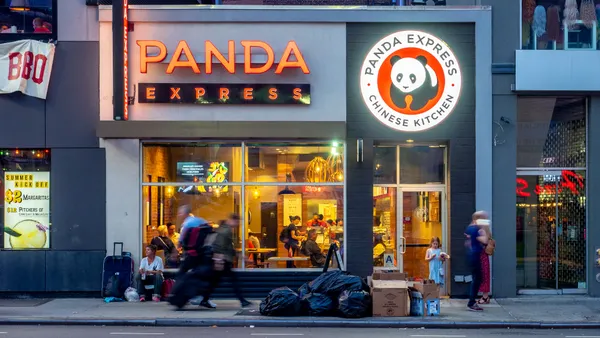Dive Brief:
- To woo people away from using their devices at the dinner table, a casual-dining U.K. restaurant chain will offer a complimentary kids' meal to families who leave their phones in a box during their meal, the BBC reported. The offer goes through Dec. 7.
- Frankie & Benny's, which operates 250 restaurants, conjured up the "No Phone Zone" promotion after a proprietary survey revealed that 10% of children have hid a parent's phone to get attention. About a quarter of parents admitted to checking their phones during mealtime and when their kids shared details of their day.
- Other chains have recently taken steps to curb certain phone and computer habits. This week Starbucks announced that starting next year, it would implement a filter on its free Wi-Fi that will block pornographic sites and other explicit content. McDonald's, Subway and Chick-fil-A have used similar filters since 2016 or earlier, according to Business Insider.
Dive Insight:
With customer experience at the forefront of restaurant design and marketing these days, eateries have been nudged into an unexpected role policing socially acceptable behavior while balancing the promotional benefits that technology brings.
When social media became a critical marketing tool, many restaurants responded by building Instagram tables equipped with overhead LED lights and indulging in extra "wow" factors suited for the sharing platforms. The free marketing can be hard to deny. Yet others have fought the tide, unveiling phone-free incentives similar to Frankie & Benny's, such as a free glass of wine in Sydney and a free dessert at Le Pain Quotidien for locking phones in a safebox. Customers might need the quid-pro-quo to take the phone-free plunge, but some establishments have opted for a more subtle approach. Eleven Madison Park, for example, only encourages guests to plop their phone in a box and enjoy the $315-per-head meal, and even sports lounges have tried the nudge approach, according to Eater.
Policing content can be tricky, as Facebook and Twitter have realized all too well in the past two years. In the case of pornography, that behavior can become criminal, according to Enough Is Enough, the internet safety nonprofit that pushed chains including McDonald's and Panera to block certain explicit or exploitative sites from its Wi-Fi networks.
The group lobbied Starbucks and McDonald's back in 2016 but only the latter followed through. Starbucks filters such content in the U.K., signaled by a "Friendly WiFi" sticker distributed by the Internet Watch Foundation, which lists more than 75,000 URLs found to show images or videos of child sexual abuse. Starbucks said it was searching for a solution that didn't inadvertently block appropriate content. Whether it found the best tool or not, the coffee giant succumbed to additional pressure and a 26,000-signature petition this week.
Customers spend hours in the chain's 14,000 U.S. coffee shops surfing the web, whether studying, working or shopping. In one sense, they will do what they want on that free Wi-Fi network, and savvy users can potentially bypass filters anyway. But businesses should protect themselves from liability by offering secure networks that adhere to all local and federal laws.










